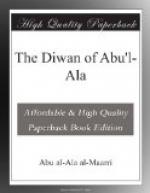As for the power of the weak, we have some instances from Abbaside history. One of the caliphs wanted to do deeds of violence in Baghdad. Scornfully he asked of his opponents if they could prevent him. “Yes,” they answered, “we will fight you with the arrows of the night.” And he desisted from his plans. Prayers, complaints, and execrations which the guiltless, fighting his oppressor, sends up to heaven are called the arrows of the night and are, the Arabs tell us, invariably successful. This belief may solace you for the foundation of suffering (quatrain 71), which, by the way, is also in the philosophic system of Zeno the Stoic. Taking the four elements of Empedocles, he says that three of them are passive, or suffering, elements while only fire is active, and that not wholly. It was Zeno’s opinion that everything must be active or must suffer. . . . An explanation for our suffering is given by Soame Jenyns, who flourished in the days when, as his editor could write, referring to his father Sir Roger Jenyns, “the order of knighthood was received by gentlemen with the profoundest gratitude.” Soame’s thesis is his “Free Inquiry into the Nature and Origin of Evil,” that human sufferings are compensated by the enjoyment possibly experienced by some higher order of beings which inflict them, is ridiculed by Samuel Johnson. We have Jenyns’s assurance that
To all inferior animals ’tis
given
To enjoy the state allotted
them by Heav’n.
And (quatrain 75) we may profitably turn to Coleridge:
Oh, what a wonder seems the fear of death!
Seeing how gladly we all sink to sleep;
Babes, children, youths and men,
Night following night, for threescore
years and ten.
We should be reconciled, says Abu’l-Ala (quatrain 76), even to the Christian kings of Ghassan, in the Hauran. These were the hereditary enemies of the kings of Hirah. On behalf of the Greek emperors of Constantinople they controlled the Syrian Arabs. But they disappeared before the triumphant Moslems, the last of their kings being Jabalah II., who was dethroned in the year 637. His capital was Bosra, on the road between the Persian Gulf and the Mediterranean. Nowadays the district is chiefly occupied by nomads; to the Hebrews it was known as Bashan, famous for its flocks and oak plantations. We can still discern the traces of troglodyte dwellings of this epoch. The afore-mentioned Jabalah was a convert to Islam, but, being insulted by a Mahometan, he returned to Christianity and betook himself to Constantinople, where he died. But in the time of Abu’l-Ala, the Ghassanites were again in the exercise of authority. “These were the kings of Ghassan,” says Abu’l-Ala, “who followed the course of the dead; each of them is now but a tale that is told, and God knows who is good.” A poet is a liar, say the Arabs, and the greatest poet is the greatest liar. But in this case Abu’l-Ala in prose was not so truthful as in poetry; for if Jabalah’s house had vanished, the Ghassanites were still a power. The poet, for our consolation, has a simile (quatrain 77) that may be put against a passage of Homer:




